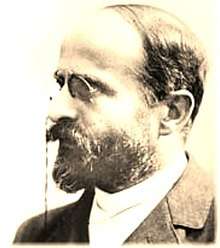Theodor Lipps
Theodor Lipps (German: [lɪps]; 28 July 1851 – 17 October 1914) was a German philosopher, famed for his theory regarding aesthetics, creating the framework for the concept of Einfühlung (empathy), defined as, "projecting oneself onto the object of perception."[1] This has then led onto opening up a new branch of interdisciplinary research in the overlap between psychology and philosophy.[2]
Theodor Lipps | |
|---|---|
 Theodor Lipps (unknown year) | |
| Born | 28 July 1851 |
| Died | 17 October 1914 (aged 63) |
| Era | 19th-century philosophy |
| Region | Western philosophy |
| School | Munich phenomenology |
Notable ideas | Lipps–Meyer law |
Influences
| |
Influenced
| |
Biography
Lipps was one of the most influential German university professors of his time, attracting many students from other countries. Lipps was very concerned with conceptions of art and the aesthetic, focusing much of his philosophy around such issues. Among his fervent admirers was Sigmund Freud. Lipps then being the main supporter of the idea of the Unconscious.[3] He adopted Robert Vischer's notions of empathy or esthetic sympathy (Einfühlung, literally translated to "feeling-into"). This concept of aesthetic resonance finds parallels throughout aesthetic philosophy. Late in life, Lipps adopted some ideas from Edmund Husserl. Disliking his psychologism, some of his students joined with some of Husserl's to form a new branch of philosophy called phenomenology of essences. Among them there was Moritz Geiger who wrote one of the first phenomenological essays on the essence and meaning of empathy in which the influence of Lipps is relevant.[4]
See also
References
- "Theodor Lipps | German psychologist". Encyclopedia Britannica. Retrieved 2018-11-07.
- Curtis, Robin; Elliott, Richard George (December 2014). "An Introduction to Einfühlung". Art in Translation. 6 (4): 353–376. doi:10.1080/17561310.2014.11425535. ISSN 1756-1310.
- Pigman, G.W. Freud and the history of empathy, The International journal of psycho-analysis, 1995 Apr.; 76 (Pt 2):237–56.
- Gödel, Florian (2015), "An introduction to Moritz Geiger’s psychological contribution on empathy." Dialogues in Philosophy, Mental and Neuro Sciences, 8(1):161–8.
Sources
- Hatfield, G. Psychology Old and New, Institute for Research in Cognitive Science Technical Report No.IRCS-01-07 (University of Pennsylvania, 2001)
- Lyubimova, T. "On the Comic", in: Aesthetics, Art, Life: A Collection of Articles, compiled by T. Lyubimova, M. Ovsyannikov; general editorship by A. Zis; translated from the Russian by Sergei Syrovatkin (Moscow: Raduga Publishers, 1988), pp. 200–211.
External links
- Works by Theodor Lipps at Project Gutenberg
- Works by or about Theodor Lipps at Internet Archive
- Some digitized texts by Lipps in the Virtual Laboratory of the Max Planck Institute for the History of Science